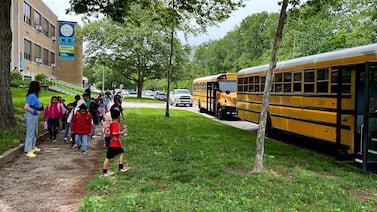Sign up for Chalkbeat Newark’s free newsletter to get the latest news about the city’s public school system delivered to your inbox.
As the number of children diagnosed with autism rises in New Jersey, Rutgers University is launching a new federally funded program to prepare the next generation of special education administrators.
Backed by a five-year $3.75 million grant from the U.S. Department of Education, the new program called Preparation of Administrators in Special Education, or PASE, will provide full scholarships and stipends for certified special education teachers to earn a doctoral degree and move into leadership roles overseeing special education programs in schools. The program is currently accepting applications, with the first group of students scheduled to begin in January 2026.
Proposed federal cuts to special education funding, staff reductions, and changes in oversight that could worsen existing challenges, particularly in low-income districts like Newark, deepen the need for strong special education leaders, said Dake Zhang, the PASE program coordinator, who also has a son with severe autism.
What’s more, President Donald Trump’s administration has attempted to terminate teacher-training grants this year and laid off federal employees overseeing special education enforcement as part of a broader plan to dismantle the U.S. Department of Education.
Zhang, who is also a professor of special education at Rutgers Graduate School of Education, hopes PASE will help fill leadership roles with “people who have a strong special education background and real classroom experience.”
“Many of these [administrative] positions are filled with people who are not really special education educators, who are not certified in teaching special education, or have not had adequate experiences working with students with disabilities. That’s a concern,” Zhang added.
The new program comes as autism rates in the United States hit a record high this year, with 1 in 31 children identified with autism, according to a Centers for Disease Control and Prevention report released in April. In New Jersey, the rate is slightly higher, with 1 in 29 children being diagnosed with autism, the report found.
Rutgers researchers also found that as of 2020, 1 in 20 Newark children had been diagnosed with autism, compared with 1 in 167 in 2000. That increase has been felt by Newark Public Schools, where more than 7,000 students receive special education services, and where the district is faced with a shortage of qualified special education staff and administrators. Those shortages are on par with national trends that show nearly all states reported special education teacher shortages and high turnover rates during the 2023-24 school year.
The PASE program is a partnership between Rutgers University, the University of South Carolina, and Northern Arizona University. Rutgers PASE students will participate in shared courses, internships, and virtual seminars with their peers at the South Carolina and Arizona schools. University staff will recruit students from a pool of certified special education teachers with at least three years of full-time experience working with students with disabilities.
Students will earn a doctorate in education in roughly four and a half years through hybrid coursework taught by Rutgers education experts, research projects, and a dissertation focused on improving special education administration. The students will also participate in summer residences at each university, including visits to schools serving students with disabilities in South Carolina and Arizona.
The program has received federal funding for its first year, and pending its progress, will receive funding for the following years.
Zhang said she is hopeful the funding will continue. She recalled instances where special education teachers had trouble understanding her son’s needs and “didn’t really understand what it meant to have a student with a severe disability.”
“As an administrator, one thing they should understand is the teaching load and the challenges of special education teachers. Nationwide [special education teachers] have a very high attrition rate, and that’s because of the workload, a lot of burnout, and inadequate support,” Zhang added.
Zhang said she has already received applications from educators in Newark and Camden and hopes the program will strengthen leadership pipelines in the state’s highest need districts. Rutgers faculty are also looking to partner with Newark Public Schools and local organizations that support students with disabilities to serve as mentors or guest speakers for the program.
Jessie Gómez is a reporter for Chalkbeat Newark, covering public education in the city. Contact Jessie at jgomez@chalkbeat.org.




